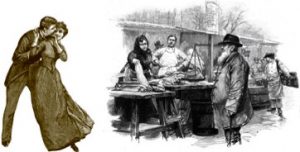
“On the Saturday before Christmas a great cattle market is held here; and on the Saturday after Christmas, is a great holiday-fair, called a ‘Giglet,’ or ‘Giglet Market’; that is, a wife market; at which the most rustic swain, if weary of his bachelorship, is privileged with self-introduction to any disengaged fair one who may attract his particular fancy.” Below ia a dialect poem recounting one man’s visit to the Okehampton Giglet Fair.
Okehampton Giglet Fair 1865
Gude raiders yull awn et is tru wat I zay,
Last Zaterday yer waz a winderfull day,
Ver all sorts a vokes come vrom both var an near,
Ta our gigalets market ivery yer,
Zum in love whey thur sweetharts, and zum whey that cup;
An et maint be amiss ef I rekon ein up –
There wus all sorts a girls vrim thuse ‘net quite sa gree’
Ta the innicent flower tha girl a zixteen,
I’d be boun now these minet ta lose me hole hat
Ef ther wadden a sight yer much younger thin that;
Thur wus all sorts a men vrim those fond of a lark
Ta thuse go a head chaps call ‘nit up ta mark.’
There waz gaffers and nitsellers, chums of each grade,
Who cud do a nice trick, bit it wadden ther trade;
A fella whey cards I may menshun ver wan
Ziad you cuden tell which tha number wus pun,
Zo I zaid, wull I try tha right caird I cud zee,
Zo I bett’n a crown, daarney that twadden ee,
There wus Missus Cheap Jack ver ta make her bukes shine,
Zaid her count bukes had pockets sa deep as a mine,
Like zum uv em, her zaid, which made the vokes stare,
When you cum ta tha bottom you’ll find nothing thare.
Her had copy bukes, and in a mortherly way
Here zaid, you thet have childrin now mark what I zay
Give em larning, I pray, if you cant give em gold –
All thus lot vur sixpence, who’ll let me zay sold,
The pickaxe want earn them sa much as that pen.

A farmer hold up his vinger, her cried, ‘sold again.’
Stap missus he zaid, now honney sis luk,
I’ve got children thet knaw mor’n yuve got in yer buke;
They knaw how ta dance, an they knaw how ta play,
An they knaw how ta have everything ther own way,
They knaw tha last fashin, they knaw the last tune,
Ef they don’t stap ther gallop they’ll rin me down zune.
Now bother yer head, standing thare wey yer jaw,
Canne jis tell me wan or two things they dun knaw?
Her zaid, ‘ I’ll be candid and speak as a vrend –
They dun knaw how ta earn, bit they know how ta spend,’
And her zaid something soft bout ther ‘stocking ta mend.’
Than tha man scrathed his head and zaid, ‘ true as I zay,
They’ve all a bin schooled, bit bin schooled tha wrang way.’
Her zaid, ‘very likely,’ than cried, ‘but whe wull,’
Which shawed her cud preach, bit her pack was ta zell.
I mus pass on ta notice in shape of a man,
A chap wey one foot, and that haden a han;
He wrote wey his toes, and it tickled me when
Vokes zaid, zee how clever he handles a pen;
Bit the last thing uv all I zeed ver tha day,
Was the Tavistock Band! my eyes diden em play,
Ther wus thirty I think if you count girt an small
And many volks zaid they was totallers all,
Tho I can’t du min justice, I’ll du wat I can,
Wull to sume et up neat t’was a butiful band.
In the night I zeed, too, sich a plump-lookin lass,
Gud lookin enough, bit a sight more a brass,
A coaxing zum fella ta give her a glass,
An yu’d hardly knaw wicher – tha bitch wus sa bold,
That her vald in love wey, tna gude man er his gold.
As he started away without better ner wus,
I zaid take care theee zell, or thee’t zune loss thee purse,
Thare’s a sharp-lookin fella that wanth un down there,
What a gude job tis tu thet thee wive idden here.
Thare was chaps with black faces that zingd well enuff,
Bit zum nv there zongs wus a brave sight to ruff.
There wus lots a things else ef yum living and wull
Next yer better cum there an zee ver yer zell.
 Legendary Dartmoor The many aspects past and present of Dartmoor
Legendary Dartmoor The many aspects past and present of Dartmoor
